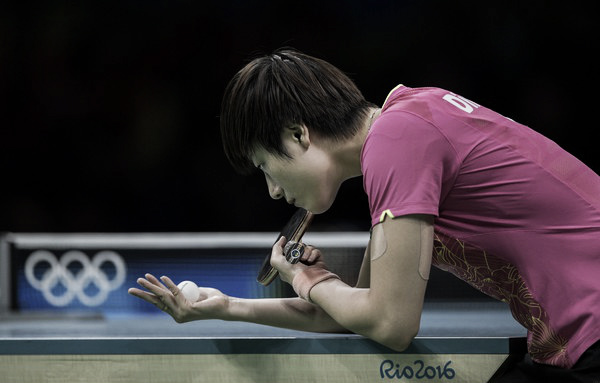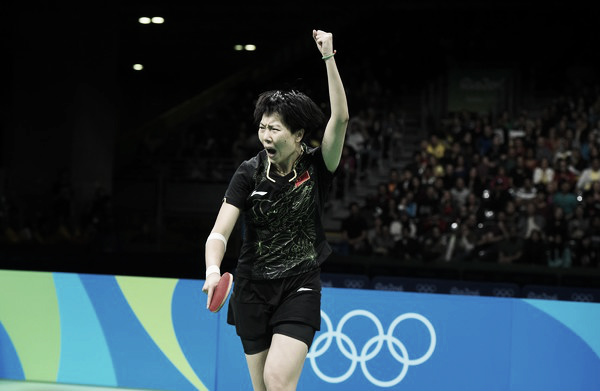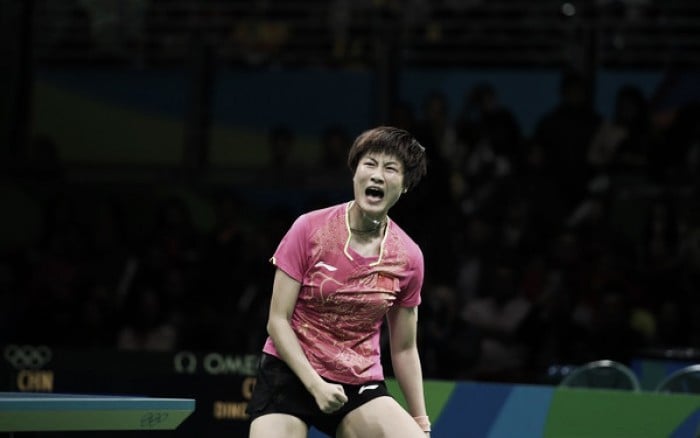As the two Chinese table tennis players cruised through the rest of the Olympic field, it became apparent that the only players that could knock them off were each other. Coming into the gold medal final, Ding Ning was 3-0 in matches with a 12-1 overall record. Li Xiaoxia was 3-0 in matches with an unblemished 12-0 record in games.
Finally, the gold medal match came, a rematch of the 2012 final, which Li won. However, Ding Ning did not let this opportunity at an Olympic gold medal go to waste, as the 26 year old won a grueling seven-game match 11-9, 5-11, 14-12, 9-11, 8-11, 11-7, 11-7.
Ding Ning holds off Xiaoxia in Game 1
Ding Ning cruised early in Game 1, racing off to a 6-1 lead in a fast-paced action packed game. The rallies were often quick and ended with spectacular smashes. Initially those smashes came off of Ning's paddle, but after building a 9-3 lead, the Olympic No. 1 began to cave in, surrendering five straight points, watching her lead get whittled to just one point. The streak included an unlikely sweep of Ning's serve by her Chinese teammate, who achieved the rare feat by watching one of Ning's return sail long and also sharply returning a volley with an expertly placed backhand to take the serve. However, in the most critical point of the game, Ning used excellent footwork to return several smashes from Li, returning shots while shuffling around, several paces away from the table. Eventually the 3rd seed fired one shot long, giving Ning the critical point. Ning was pushed to two game points but ultimately secured the victory with a forehand smash.

Li Xiaoxia cruises in Game 2
In Game 2, it was Li jumping out to the huge lead, as she would stay in cruise control en route to a 11-5 thumping of Ding Ning. Up 4-3, Li won five straight points with spectacular combinations of sizzling forehands and sharp backhands to befuddle Ding, who looked overwhelmed in errantly returning many of her compatriot's shots. Ding got two points back, but Li rebounded to sweep her own serve, including the lone game point of Game 2, cruising to an easy victory in Game 2.
Ning battles back to negate Li's comeback
In the tightest game yet, Li battled back from deficits to 6-2, 7-3, 8-5, and 9-7 to take a 10-9 lead. However, on three separate game point chances, Li failed to capitalize, opening the door for Ding to score three straight points and rally to take back the game that was initially hers to win, 14-12.
The game got off to an excellent start for Ding, who ripped off five straight points for a 6-2 lead. Li finally scored again after a bachand from Ding hit the net but Ning responded with a point of her own. However, gradually, the defending gold medalist narrowed the gap, scoring two straight points to make it 8-7, then, after giving up a point, scored three straight points, mostly courtesy of two net returns by Ding. Ding was ready for the game point and forced a long return from Li, ensuring that there would be extra points needed. Ding would save two more game points on errant forehands from Li, eventually winning after an error from Li gave her the lead, allowing her to polish off the victory with an excellent forehand smash.
Ning's comeback wasted; Li evens match
Much like her Game 2 victory, Li got off to an excellent start, using a quick 4-0 run, including three sharp winners, to open up a 5-1 lead. Ding won the next five points, keyed by four Li errors. Ding also led 7-6, but Li scored three straight points, punctuated by a rare table tennis ace to earn a 9-7 advantage. The Chinese teammates split the next two points, setting up double game point for Li. Ding saved one of the points, but a remarkable forehand smash closed out Game 4 in favor of Li, 11-9.
Li dominates early on, holds on in Game 5
Once more, Li had her way with Ding at the beginning of the game, using two excellent winners to open up a 5-1 lead. Li did not take her foot off the gas pedal, continuing to pour the pressure on Ding. A critical point came when Li was up 7-3, and the two paddlers partook in a long exchange of hard smashes up and down the table. On the defensive, Li constantly had an answer sending the ball right back at Ding, until the top player in the world finally sent a shot long to give Li the point. Li would open up a 10-4 lead but watched it get closed to 10-8. Finally, on her fifth game point, Li would put enough topspin on the ball so that it dove off of Ding's paddle, short-hopping the net and giving Li the victory, bringing her within one game of defending her gold.

Ning controls Game 6; forces deciding Game 7
Ding Ning came out of the gate on fire in Game 6, scoring the first three points and then was happy to settle for even play the rest of the way, eventually garnering the 11-7 victory, a rare easy victory against her Chinese counterpart for Ding. Li drew within one point just once (6-5), but the Olympic No. 3 promptly sliced a shot into the net and was tied up on a shot directly down the middle to restore Ding's 3-point advantage. Ding needed just one game point to secure the victory to another return into the net from Li.
Ding Ning finally grasps elusive gold medal
Four years after missing out on an Olympic gold medal to this very same opponent, Ding Ning did not let the same opportunity go to waste. Ding roared out to a 3-0 lead, but surrendered three quick points to tie it up. Just when it looked like Li had the momentum, Ding responded with six of the next seven points for a 9-5 lead. A critical bounce off the net went Ding's way when the ball tipped the net and dribbled over on to Li's side, an extremely lucky point which Ding acknowledged. After gaining a point to narrow the gap to 6-4, Li made three straight errors and trailed 9-4. Each player made an error to set up Ding with five gold medal points. Her first two went to waste, and Ding called a timeout. On the first rally returning from the 60-second break in action, Li lifted a shot too long, setting off a wild celebration for Ding Ning, who saw tears of joy escape from her eyes, grasping what is the medal that represents the pinnacle of her spectacular career.

